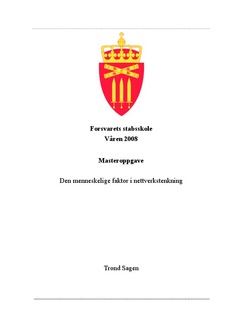Den menneskelige faktor i nettverkstenkning
Master thesis
Permanent lenke
http://hdl.handle.net/11250/99908Utgivelsesdato
2008Metadata
Vis full innførselSamlinger
- Masteroppgaver [466]
Sammendrag
The purpose of this thesis is to highlight some of the main areas that are important for decisionmakers as part of a Network Centric Warfare Concept. Network Centric Warfare was developed in the USA, and the concept was inspired by multinational worldwide companies, which had a high level of ambition concerning technology and organizational development. NATO has its own development work, and their concept, NATO Network Enabling Capabilities, (NNEC) is the one that the Norwegian development work must have close connections with. The Norwegian concept of network centric warfare is based on NNEC, and is the result of the Norwegian research and development work. The purpose of the NNEC is to improve the efficiency of the units interacting in networks and utilizing the possibilities, decision-makers have to share information between participating countries, organizations and units. This thesis opens with a theoretical part, based on Norwegian literature within the field of network centric warfare, which will constitute the basis for the survey part. The theoretical part shows that there are three main factors that are important for decision-making as part of a Network Centric Warfare Concept. These factors are situational awareness, flexibility and leadership mode. Flexibility is three-dimensional; flexibility with respect to decision making, flexibility with respect to organization and flexibility with respect to behaviour. The empirical data have been collected through qualitative interviews with some central leaders in the Armed Forces and some informants with close connections to the Armed Forces. The informants and some of the military leaders have been central persons during the development of the concept. Some of them are central leaders of today’s army, which means that they can be important for the implementation of the concept. The aim of the study is to indicate directions of the informant’s opinions. The aim is not to be able to general findings to the Norwegian Armed Forces.
